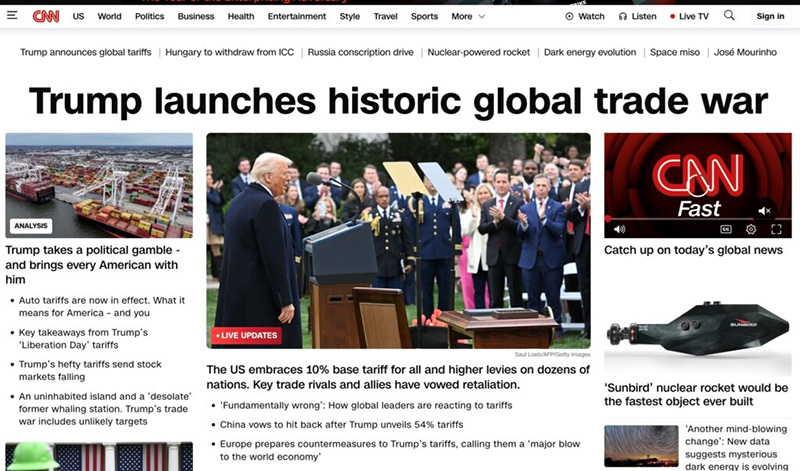
Commentators should know better than to pretend that the shock Trump is now delivering is both “unprecedented” and bound to fail like all “reckless” assaults on the prevailing order. The Nixon Shock was more devastating than the one delivered today, especially for Europeans, writes Yanis Varoufakis, an economist and former Greek Minister of Finance, at ‘UnHerd’.
“My philosophy, Mr President, is that all foreigners are out to screw us and it’s our job to screw them first.” With these words, the US Treasury Secretary convinced the President to deliver a colossal shock to the global economy. In the words of one of the President’s men, the objective was to trigger “a controlled disintegration of the world economy”.
No, those words were not spoken by members of President Trump’s team in advance of their “Liberation Day” tariff splurge. While the “foreigners are out to screw us” certainly has a Trumpian ring, it was uttered in the summer of 1971 by then Treasury Secretary John Connally, who succeeded in convincing his President to unleash the infamous Nixon Shock a couple of days later.
Commentators should know better than to pretend that the shock Trump is now delivering is both “unprecedented” and bound to fail like all “reckless” assaults on the prevailing order. The Nixon Shock was more devastating than the one delivered today, especially for Europeans. And precisely because of the economic devastation caused, its architects achieved their main long-term objective: to ensure American hegemony grew alongside America’s twin (trade and government budget) deficits.
Trump is therefore not the first President to seek the controlled disintegration of the world economy by means of a devastating blow. Nor is he the first to purposely damage America’s allies to renew and prolong US hegemony. Nor the first who was prepared to hurt Wall Street in the short run in the process of strengthening US capital accumulation in the long term. Nixon had done all that half a century earlier.
And the irony is that the world the Western liberal establishment is grieving over today came into being as a result of the Nixon Shock. While admonishing the idea of a US President delivering a rude shock to the world economy, they are lamenting the passing of what only came into being because of another President’s readiness to deliver an even ruder shock. That is, the Nixon Shock gave birth to the darlings of today’s liberal establishment: neoliberalism, financialisation and globalisation.
That meant unshackling Wall Street from all the constraints placed upon it under the New Deal, the War Economy and the Bretton Woods system. After four decades of controlling the bankers so they would not inflict another 1929, Nixon’s team liberated them. But doing so required a new economic theory wrapped up in a suitable political ideology.
Under neoliberalism’s ideological and pseudo-scientific cover, bankers found themselves with billions of foreign dollars to play with in a deregulated environment: financialisation. The more this new world system relied on US deficits that generated the necessary demand for European and Asian exports, the greater the volume of trade necessary to stabilise this purposely imbalanced globalised system. And thus globalisation was born.
Many refer to this world — the one in which Gen X grew up — as the neoliberal era, others associate it with globalisation, some identify it with financialisation. It’s all the same thing — the world the Nixon Shock begat and which the 2008 financial crash shook to its foundations. After the 2009 bailouts, although US hegemony continued unabated, it lost much of its dynamism. Today, the Nixon Shock has run out of steam — at least from the perspective of the Trumpists who want to give US hegemony a second (or is it a third?) wind. This is the whole point of the Trump Shock and its masterplan, including tactical moves such as enlisting crypto to their cause.
The outcome of the Trump Shock will depend on whether it has staying power, for which it will probably need bipartisan support. Is the US political system still capable of that degree of bipartisanship? It seems unlikely but, then again, who would have imagined that Biden would embrace Trump’s China tariffs and escalate the New Cold War his predecessor started?
And if the Trump Shock has anything like the success of the Nixon Shock, what will this world look like? Perhaps it is too early to tell, but neoliberalism is already being contested by the technofeudal creed of neoreactionaries such as Peter Thiel. Cloud capital is displacing financial capital and replacing the divine role of the market with the holy grail of the transhuman condition (the merger of cloud capital, AI and the biological individual). Financialisation will soon be under similar pressure. As AI develops, Wall Street will not be able to continue resisting the merging of cloud capital and finance, as seen in Elon Musk’s ambition to turn X into an “everything app”.
Such developments will do to payments what the internet did to fax machines, with serious repercussions for financial stability, including any future role for the Federal Reserve. And in place of the dream of a Global Village, we will have the Walled Nation. Nevertheless, that globalisation recedes does not mean that autarky is possible. The Trump Shock is pushing us into a Bisected Planet, one part of it comprising vassal countries that have yielded to the Trump Plan and a second part where the BRICS experiment is allowed to take its course.
Every generation likes to think it is on a cusp of some historic transformation. But ours is cursed enough to actually be on such a cusp. So rather than focusing too much on the character of the man in the White House, we would do well to recall that the Nixon Shock was much more important than Nixon. If Nixon reshaped the world once, leaving it nastier and more unbalanced, Trump can certainly do it again.
read more in our Telegram-channel https://t.me/The_International_Affairs

 11:28 08.04.2025 •
11:28 08.04.2025 •






















